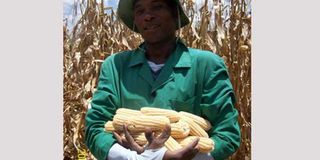Kenyan researchers step up trials for genetically altered crops in bid to fight hunger

A man holds a harvest of a GM maize variety at the Kari research station in Kiboko, Makueni County. National field trials for genetically modified maize (BT maize) have reignited interest in the bid by government and private companies to use science to produce more food. FILE PHOTO | NATION MEDIA GROUP
What you need to know:
- The new variety that has shown encouraging resilience in semi-arid areas and has shown resistance to insects and drought-tolerance capabilities resulting to high yields.
- Confined field trials for transgenic sorghum containing pro-vitamin A and enhanced iron and zinc bio-availability are currently under way.
- Other products currently under scientific investigation include bananas, pigeon pea, yams, sweet potatoes, potatoes, cowpeas and beans.
- Kenya could be on the way to turning unproductive parcels of land into arable lands.
National field trials for genetically modified maize (BT maize) have reignited interest in the bid by government and private companies to use science to produce more food cheaply.
The situation has been made more urgent as the population continues to grow and worsening climatic conditions make more and more people vulnerable to starvation due to their inability to produce enough food to feed themselves.
The National Biosafety Authority (NBA) and the Kenya Agricultural and Livestock Research Organisation (Kalro) have been conducting confined trials for various crops aimed at easing the hunger pangs while creating new avenues for Kenyans to earn money through propagating genetically modified seeds and commercial planting of Kenya’s staple foods.
BT maize was the latest to be released for national field trials, which will see new varieties chosen for eventual release to individual farms.
The new variety that has shown encouraging resilience in semi-arid areas has shown resistance to insects and drought-tolerance capabilities resulting in high yields.
These attributes, technologists say, could produce higher yields at a cheaper rate since farmers would apply less amounts of pesticides, leading to healthier food crops with low chemical residual levels.
SEMI-ARID AREAS
Confined field trials for transgenic sorghum containing pro-vitamin A and enhanced iron and zinc bio-availability are currently under way and are aimed at enabling poor populations in semi-arid and arid areas to access GM sorghum that will address reported developmental challenges among children.
Last week, the National Biosafety and Appeals Board visited Kalro’s Thika farm to inspect genetically modified cassava that is currently undergoing field tests to crosscheck its resilience to cassava virus diseases that cause significant losses.
The Virus Resistant Cassava for Africa project aims to develop improved cassava varieties resistant to the cassava brown streak and cassava mosaic diseases, thereby enabling families to produce enough for their own use and surplus that could be sold for extra income.
The National Biosafety and Appeals Board is closely monitoring Bt cotton, which was released for national field trial last year after it showed positive gains at confined field trials.
Its key proponent and the principal investigator, Dr Charles Waturu, described commercialisation of Bt cotton as the only solution to the ailing cotton sub-sector, where Kenya produces 20,000 bales compared with Uganda’s 400,000 bales and Tanzania’s 700,000 bales.
IMPROVED CHICKEN
Kenya’s reliance on scientific research has also seen Kalro Naivasha propagate the improved chicken currently being sold at Sh1,000 per piece compared with the traditional breeds that hardly earn more than Sh500.
The Kalro chicken gains weight faster and is known for its resistance to a variety of chicken diseases and since its launch three years ago, several private propagators have emerged while women self-help groups have been given ‘seed’ improved chicken to help propagate the new breeds.
The government-driven project seeks to improve food security as well as the nutritional value.
Interestingly, bees enjoy global recognition as pollinators and continue to enjoy specific attention from researchers globally with the African bee population showing a unique ability to continue growing compared with American bee populations, which have recorded significant decreases blamed on increased use of pesticides.
Other products currently under scientific investigation include bananas, pigeon pea, yams, sweet potatoes, potatoes, cowpeas and beans.
Interestingly, Kenya continues to be a transit point for humanitarian GM corn and corn-soya blends, among other GM food supplies being taken to various regions for feeding starving populations especially in northern Kenya, South Sudan and Somalia by the World Food Programme and USAID East Africa.
And with the advent of GM high-yielding and disease-resistant varieties, Kenya could be on the way to turning unproductive parcels of land into arable lands where emerging new companies will launch operations to propagate the new varieties.





